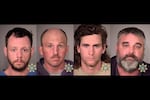
Opening statements got underway Tuesday for the trial of the second group of defendants charged in connection with the 2016 armed occupation of the Malheur National Wildlife Refuge.
Speaking at the U.S. District Courthouse in Portland, Assistant U.S. Attorney Geoff Barrow told jurors the case they were hearing was simple.
He said it was "simple" because for 41 days the employees who worked at the refuge near Burns, Oregon, weren't able to do their jobs.
Four defendants are on trial this time: Duane Ehmer, Jason Patrick, Darryl Thorn and Jake Ryan. They've been charged with felony conspiracy. Three also face felony weapons charges, and all of the defendants are accused of trespassing and other misdemeanors.
Last year, a jury acquitted Ammon Bundy and other leaders of the occupation on all federal felony charges they faced.
This second trial matters because it's the final opportunity for the government to prove their case that laws were broken during the occupation. For the defense, it's the chance to show last fall's surprising acquittals weren't a one-off victory.
Central to the conspiracy charge is whether the defendants taking over the refuge intended to prevent employees from doing their jobs. It is that component of the charge the government must prove if they're to prevail.
Barrow told jurors they would hear about people who aren't in the courtroom or on trial, but all the same were linked to the armed occupation.
"Your focus must remain on the men in this room and the evidence we bring against them," he said.
Barrow said the defendants "demonstrated their determination and resolve to keep the [refuge] employees from returning to work."
In his remarks, Barrow seemed to directly address issues jurors in the first trial raised about the government's failure to prove the intent of the alleged conspiracy.
Barrow told jurors the defendants haven't been charged because of their beliefs, but rather because of what they've done. He also stressed the case isn't about a constitutional right to bear arms.
"This is a case about what the defendants did with those firearms," Barrow said, adding that they kept employees from doing their jobs.
"We will ask you to find the defendants guilty as charged," he said.
Andrew Kohlmetz, the standby counsel for defendant Patrick, said during his opening statements there was no conspiracy.
Kohlmetz told a circuitous story about the lead up to the occupation and how his client, a roofer who lost his business during the Great Recession, got involved.
"You'll hear evidence that they didn't want another Ruby Ridge, they didn't want another Waco," he said.
Kohlmetz said the case is, at least in part, about "who should decide what happens in our remote and rural counties."
"There's no conspiracy to impede these federal workers," he said.
Other defense lawyers echoed similar statements in their opening statements.
Michelle Kohler, who's representing Ehmer, said her client went to the refuge to see what was happening. Ehmer is one of the few Oregonians indicted in the case.
"When he heard there were terrorists in his backyard, he wasn't going to do nothing," she said.
After spending time at the refuge, Kohler said Ehmer spent time learning about the occupiers and why they had taken over the refuge.
"He learned (ranchers) are being driven off the land by government overreach," she said.
Ehmer has been charged with degradation of property after using an excavator to dig a trench at the refuge. Kohler said he dug a "fox hole" in case shooting started at the refuge. She said Ehmer wasn't thinking about any laws when he dug the hole.
Thorn's attorney, Marc Friedman, said his client was at the refuge for 20 days, calling him a "bit player, not a conspirator."
Friedman called Thorn a principled man who believes in the literal words and interpretation of the U.S Constitution.
"Darrly Thorn was drawn to help," Friedman said, noting that his client was not at the center, but "a guy on the periphery."
Jesse Merrithew, Ryan's attorney, said his client "didn't go to that refuge to protest federal employees." Rather, he wanted to keep the occupation in the national spotlight.
The day ended with the government calling its first witness, Greg Bretzing, the former head of the FBI Portland office who oversaw the federal response to the occupation.
Bretzing told jurors the FBI's plan was to let local law enforcement take the lead, given the Bundy family's response to federal officials during the 2014 standoff in Bunkerville, Nevada.
During cross examination, the defense asked Bretzing about tensions between the FBI and local sheriffs, who attorney Kohler said didn't believe in the government's strategy.
Bretzing said there was a "very robust discussion about how to best bring this to a peaceful resolution."
The day began with U.S. District Court Judge Anna Brown meeting with the jury in an on-the-record orientation session.
They entered court around 10 a.m. and received an oath to faithfully carry out their duties as a juror.
Brown then spent about 30 minutes reading preliminary jury instructions.
She told jurors, yet again, the defendants have been charged and are presumed innocent.
